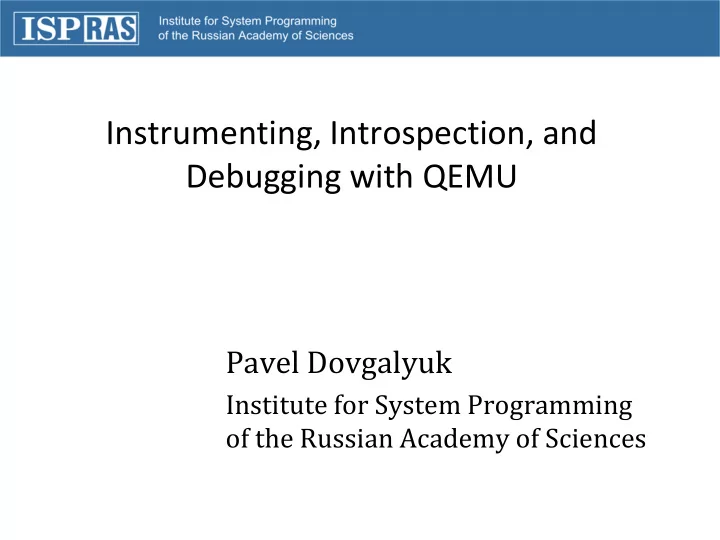

Instrumenting, Introspection, and Debugging with QEMU Pavel Dovgalyuk Institute for System Programming of the Russian Academy of Sciences
Our projects • Working on QEMU projects since 2010 (version 0.13) • Software analysis for x86 • Deterministic replay • Reverse debugging • Now working on introspection and debugging projects 2
In-VM software development and debugging • Creating new kernels/drivers • Simulating new platforms • Reverse engineering 3
Logging from QEMU -d in_asm,exec,nochain IN: 0x000ef407: lea 0x1(%esi),%eax 0x000ef40a: mov %eax,0x4(%esp) 0x000ef40e: jmp 0xef1c6 Trace 042113a0 [0: 000ef407] Trace 04211450 [0: 000ef1c6] Trace 04210f20 [0: 000ef1d5] Trace 04210f90 [0: 000ef278] Trace 04211040 [0: 000eda1b] Trace 04211170 [0: 000eda10] Trace 042112c0 [0: 000eda22] 4
Analyzing dumps with Volatility • Scripts to extract information from the dumps • Only static analysis $ python vol.py -f win7.vmem --profile=Win7SP1x86 pslist Volatility Foundation Volatility Framework 2.4 Offset(V) Name PID PPID Thds Hnds Sess Wow64 Start Exit 0x84133630 System 4 0 93 420 ------ 0 2011-10-20 15:25:11 UTC+0000 0x852add40 smss.exe 276 4 4 29 ------ 0 2011-10-20 15:25:11 UTC+0000 0x851d9530 csrss.exe 364 356 9 560 0 0 2011-10-20 15:25:15 UTC+0000 0x859c8530 wininit.exe 404 356 7 88 0 0 2011-10-20 15:25:16 UTC+0000 0x859cf530 csrss.exe 416 396 10 236 1 0 2011-10-20 15:25:16 UTC+0000 [snip] 5
GDB • Remote debugging • Can load binaries and sources to get debug information – Not very easy with enabled ASLR • Guest system is executed as a single program • Process information is not available • Cannot break on interrupts/exceptions and other events • Single-stepping may change the execution result 6
Deterministic and reverse debugging • It’s gonna take you back to the past • icount for deterministic timers • VM snapshots for faster rewind to the desired moment of execution • GDB reverse debugging commands – reverse-continue, step, next, finish • Still work-in-progress for mainline QEMU 7
GDB protocol • GDB interacts with QEMU using complex packets • Conditional breakpoints lead to many VM stops and debugger-QEMU communication – stop, request registers, recover the context, evaluate equation, continue execution • Very slow for runtime analysis – Using conditional breakpoints inside the inner loops is not practical 8
WinDbg • Support stealth Windows debugging with WinDbg • More information than in GDB • Communication is also slow • Submitted to qemu-devel • https://github.com/ispras/qemu/tree/windbg 9
QEMU API for analysis • Instrumenting guest or TCG code • Callbacks for memory accesses, MSR/CR changes, and interrupts • Memory and CPU state query interface • Communication is faster than GDB, WinDbg , QMP, … 10
QEMU-based dynamic analysis frameworks • PyREBox • PANDA • DECAF • ISP RAS • and other less mature systems 11
PyREBox • PyREBox – Python scriptable Reverse Engineering sandbox • QEMU 2.10 • Uses Volatility memory forensics • Python scripting for automated analysis • https://github.com/Cisco-Talos/pyrebox/ 12
PANDA • Platform for Architecture-Neutral Dynamic Analysis • QEMU 2.8.50 • VM introspection plugins • Taint analysis • CPU record-replay • https://github.com/panda-re/panda 13
DECAF • Dynamic Executable Code Analysis Framework • QEMU 1.0 • VM introspection plugins • Taint analysis • https://github.com/sycurelab/DECAF 14
ISP RAS • Our own approach • QEMU 2.8.50 • Subsystem for dynamically loaded plugins • Plugins for syscall and API logging in i386 Windows/Linux • https://github.com/ispras/qemu/tree/plugins 15
Requirements for QEMU analysis API • Translation events • Memory operation events • Execution events • Exception events • Disk and DMA events • Keyboard and network events • TLB events • Monitor commands 16
Instruction instrumentation • Instrument at translation – check whether callback is needed – Specific instructions – Specific addresses – Specific process • Get callbacks at execution 17
Instruction instrumentation 0xb7707010: mov %ebx,%edx ---- b770701f 00000000 movi_i64 tmp13,$0xb7707020 0xb7707012: mov 0x8(%esp),%ecx movi_i64 tmp14,$0x7fef9a788670 0xb7707016: mov 0x4(%esp),%ebx call start_system_call, $0x0,$0,tmp13,tmp14 0xb770701a: mov $0x21,%eax movi_i32 tmp3,$0xffffffffb770701f 0xb770701f: int $0x80 st_i32 tmp3,env,$0x20 movi_i32 tmp11,$0x2 movi_i32 tmp12,$0x80 call raise_interrupt, $0x0,$0,env,tmp12,tmp11 set_label $L0 exit_tb $0x7fef8e6dca13 18
Instruction instrumentation requirements • Translation callback – cpu, pc, tcg_ctx • Memory read function • TCG functions – variable allocation, code generation 19
TCG Instrumentation • Platform-independent instrumentation • Used for taint analysis in DECAF and PANDA • Not complete because of helpers – PANDA instruments them with LLVM 20
Memory accesses instrumentation • Memory ops performed through softmmu-callbacks and translated code – From cpu_ldst_template.h – invoke the callback – From tcg_op.c – embed the callback into TB • Memory forensics through exported load functions 21
Memory accesses instrumentation • Logging • Cache simulator • Forensics • Anomalies detection 22
Memory log sample Load 0x84@8 virt:ef1cd phys:ef1cd Load 0xd2@8 virt:ef1ce phys:ef1ce Load 0xf@8 virt:ef1cf phys:ef1cf Load 0x84@8 virt:ef1d0 phys:ef1d0 Load 0x23e@32 virt:ef1d1 phys:ef1d1 ---------------- IN: 0x000ef1c6: mov 0x4(%esp),%esi 0x000ef1ca: movsbl (%esi),%edx 0x000ef1cd: test %dl,%dl 0x000ef1cf: je 0xef413 Trace 043b1450 [0: 000ef1c6] Load 0xf357d@32 virt:6fa4 phys:6fa4 Load 0x65@8 virt:f357d phys:f357d 23
Generated code problems • TCG buffer overflow protection is weak OPC_MAX_SIZE Buffer Last instruction Instrumented last instruction #define MAX_OPC_PARAM (4 + (MAX_OPC_PARAM_PER_ARG * MAX_OPC_PARAM_ARGS)) #define OPC_BUF_SIZE 640 #define OPC_MAX_SIZE (OPC_BUF_SIZE - MAX_OP_PER_INSTR) 24
Generated code problems /* XXX: make safe guess about sizes */ • TCG buffer overflow protection is weak OPC_MAX_SIZE Buffer Last instruction Instrumented last instruction #define MAX_OPC_PARAM (4 + (MAX_OPC_PARAM_PER_ARG * MAX_OPC_PARAM_ARGS)) #define OPC_BUF_SIZE 640 #define OPC_MAX_SIZE (OPC_BUF_SIZE - MAX_OP_PER_INSTR) 25
Interrupts and exceptions • Only asynchronous callbacks • Logging peripheral interrupts • Detecting page mapping 26
Instrumentation applications • Logging syscalls • Logging API • Logging memory accesses – for cache simulator – for complementing in_asm+exec log • Building more complex introspection tools 27
QEMU instrumentation API • 10+ attempts to add instrumentation API • Does it have to be included into mainline? • QEMU interface may be very narrow – ~20 callbacks – ~50 exported functions Dynamically QEMU Dynamically API loaded plugin loaded plugin/tool 28
Recommend
More recommend